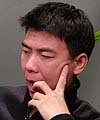|
 |
|
YOUNG SURVIVOR: A shot from Aftershock showing the girl of the twins standing in rubble after the earthquake (CFP) |
"Aftershock conveys understanding and family love. In addition to material assistance, we need to give people who suffered from a disaster more understanding and love. In the disaster, they lost everything but family love and love from others," Feng said, adding that he wanted to make a movie to showcase the love among family members of the Chinese people.
Feng said everyone had different feeling after watching the film. Many people sent short messages to him. Some said they wanted to go home to be together with their parents, some said they wanted to hug their children tightly, and some said they wanted to get married earlier than they planned.
"Chinese people prefer this kind of film reflecting family relationships in a changing society," said Hu Ke, a professor of cinema aesthetics with the Communication University of China.
Xu Fan, who played the role of the mother and also the wife of Feng, has been widely praised for her exquisite acting to portray a heartbroken mother. Feng said she provided the soul of the movie.
"The director gave me more space to act according to my own thoughts, so I could convey things I wanted to express very smoothly. We have not worked with each other for six years. In movies before this one, I just played as he asked me to. But this time was very different. We had discussions about different ways of doing things," Xu said.
The movie took Feng two years to prepare, and the shooting process was therapeutic for the cast and crew, as Feng said. In 130 minutes, Feng puts forward a shocking history through emotional scenes and computer-generated disaster scenes.
It is the 12th movie of the director and also the most expensive, with a total investment of 130 million yuan ($19.1 million). Wang Zhongjun, producer of the movie, said the target of the box office takings is around 700 million yuan ($103 million).
It is also the first Chinese film to be seen on IMAX screens. After the box office success in the mainland, the movie was screened in Hong Kong, Taiwan, and other parts in Asia. It is expected to be screened in North America in September.
Huayi Brothers Media Group, one of the investors of the movie, announced that the film was entered for a chance to complete for the Best Foreign Language Film Award in next year's Oscar.
About Tangshan
Longitude: 11 7 °3 1'-11 9 ° 1 9' E
Latitude: 3 8 ° 5 5'-4 0 °2 8' N
Area: 13,472 square km
Population: 7.34 million
Climate: Typical continental
(Source: Tangshan.gov.cn)
The Tangshan Quake
On July 28, 1976, a 7.8-magnitude earthquake struck Tangshan, an industrial city in north China's Hebei Province.
Surrounding provinces and cities such as Beijing, Tianjin, Inner Mongolia and Ningxia Hui Autonomous Region were also affected. Tangshan was completely devastated.
The disaster lasted 23 seconds. During the quake and its aftershocks, 242,769 people lost their lives and 164,851 were badly injured. It was the deadliest earthquake of the 20th century in terms of death toll.
The city was fully rebuilt in seven years after the quake.
(Source: Tangshan.gov.cn)
Feng Xiaogang
 |
|
Feng Xiaogang (CFP) | Born in 1958 in Beijing, Feng Xiaogang is known as one of China's most commercially successful filmmakers. Since his first film in 1994, many of his works have been remembered by audiences and have established box-office records one after another.
Before entering film circles, he worked as an art designer in Beijing Television Art Center. In 1985, Feng began his cinema career and served successively as art designer, screenwriter and director. In 1990, he co-wrote a hit TV comedy Stories From the Editorial Board, which made him widely known in China. In 1994, Feng's maiden work as a director Lost My Love reached the screen.
Feng gradually established a film genre of his own—New Year's celebration films. Dream Factory (1997), Be There or Be Square (1998), A Sigh (2000), Cellphone (2003) and A World Without Thieves (2004) all represent this type. The movie A Sigh pocketed five prizes at the 24th Cairo International Film Festival, including best feature film award. Cellphone won the best feature film award of the 27th Chinese Hundred Flowers Award, and A World Without Thieves won Golden Horse Award of Taiwan for best screenplay adaptation.
The action film The Banquet, though not highly spoken of, is still raking in huge pots of money at the box office. In 2007, Feng made another move in his career, shooting the war movie Assembly, which was very different from his previous comedy work. It won several awards including the best Asian film at the 28th Hong Kong Film Awards.
Following this success, Feng returned to comedy and shot If You Are the One in 2008. The film was very successful at the Chinese box office and earned more than 364 million yuan ($53.7 million), the director's top grossing film after the new Aftershock.
Since Feng's latest film Aftershock began screen last month, it has made more than 500 million yuan ($73.5 million), making him the real king of the box office in China.
Different from works of his contemporaries, Feng's films are much more concerned with lives of common people. Feng himself says he is willing to be called a director of way-we-live-now film. | 